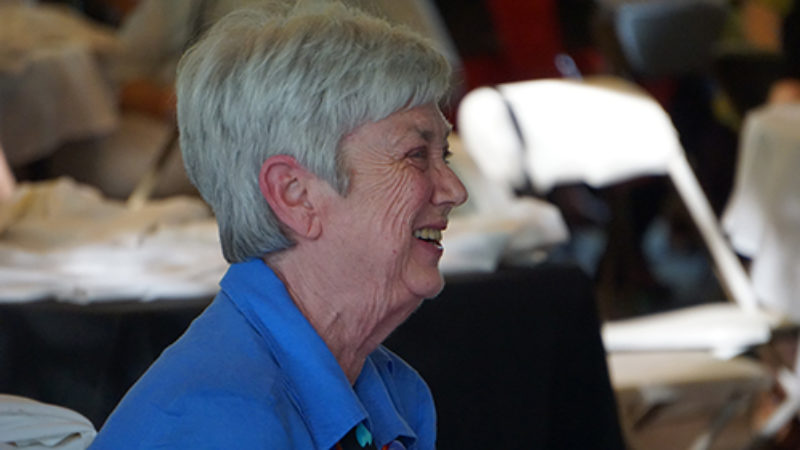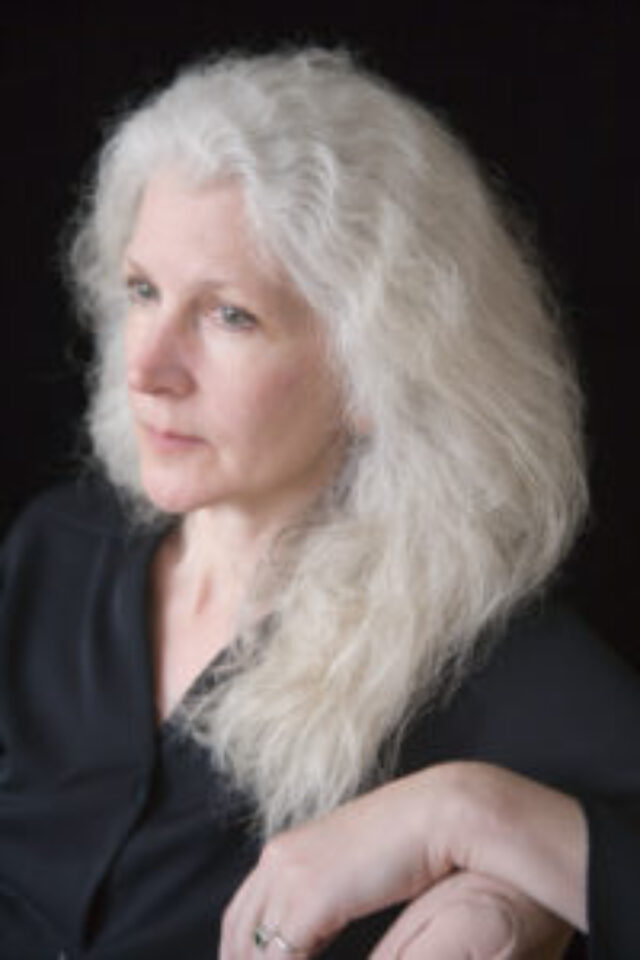
Poet Ellen Bryant Voigt founded the MFA Program for Writers at Warren Wilson College 41 years ago.
Warren Wilson College’s MFA Program for Writers is welcoming graduate students and faculty to campus for the annual summer residency. A staple since 1981, the two-week session features free public readings and lectures by some of the world’s most acclaimed writers in poetry and fiction.
“The MFA Program for Writers at Warren Wilson College provides an outstanding opportunity for the Asheville community: free lectures and readings by world-class authors,” said Debra Allbery, director of the MFA Program for Writers at Warren Wilson College. “We’re delighted, too, that Malaprop’s will partner with us this summer, selling our faculty’s books at the evening readings.”

2015 Rea Award for the Short Story winner Andrea Barrett is one of the of the MFA Program for Writers faculty members presenting a free reading during the summer residency at Warren Wilson College. Photo by Barry Goldstein.
The 2017 nightly, public readings are scheduled for July 5-14. The events feature 27 faculty members this summer. Expected to present are poet Ellen Bryant Voigt, 2015 MacArthur Fellow and MFA Program for Writers’ founder; Heather McHugh, poet and MacArthur Fellow; Alan Shapiro, poet and Pulitzer Prize finalist; and Andrea Barrett, winner of the 1996 U.S. National Book Award for Fiction and a MacArthur Fellow. Graduate students will also read during the residency.
In addition to the readings, 10 faculty lectures are scheduled throughout the two weeks. In addition to her reading, Heather McHugh will also discuss “The Object of Art” in a lecture slated for July 13. Other 2017 lecturers include novelist Peter Turchi presenting “The Strategic Release of Information or A Funny Thing Happened on the Way to the Information Dump” and novelist and playwright Robert Boswell with a talk about “Dreaming in the Future Tense: A Memoir of Teaching Immigrant Stories While Reading ‘The Lord of the Rings.’”
Unless otherwise noted, lectures and readings are held in the Gladfelter Student Center’s Canon Lounge on the Warren Wilson College campus. Most free readings begin at 8:15 p.m., and lectures happen before noon.
The schedule is subject to change.
SCHEDULE: Readings by faculty
Wednesday, July 5, at 8 p.m.
Ana Menéndez, Maurice Manning, Hanna Pylväinen, Robin Romm, C. Dale Young
Thursday, July 6, at 8:15 p.m.
Stephen Dobyns, Daisy Fried, Matthew Olzmann, Dominic Smith, Sarah Stone
Friday, July 7, at 8:15 p.m.
Brooks Haxton, Debra Spark, Peter Turchi, and a tribute to Thomas Lux
Saturday, July 8, at 8:15 p.m.
Karen Brennan, Christopher Castellani, Jeremy Gavron, Rodney Jones, Sally Keith
Sunday, July 9, at 8:15 p.m.
Debra Allbery, Andrea Barrett, Alan Shapiro, Robert Boswell
Monday, July 10, at 8:15 p.m.
No readings
Tuesday, July 11, at 8:15 p.m.
Heather McHugh, Liam Callanan, David Haynes, Laura van den Berg, Paul Otremba
SCHEDULE: Readings by graduate students
Wednesday, July 12, at 8:15 p.m.
Mark Elber, Esme Franklin, Amanda Newell, Laura Otis, Andrew Peterson, Blake Reemtsma
Thursday, July 13, in Ransom Fellowship Hall behind the College Chapel
Sarah Gauch, Leigh Lucas, Tiana Nobile, Susan Jo Russell, David Saltzman, Nomi Stone
Friday, July 14, at 4:30 p.m. in Ransom Fellowship Hall behind the College Chapel
Amy Lin, Micah Matthews, Trish Marshall, Maya Phillips, Peter Schireson
This reading is followed by the MFA Program for Writers graduation ceremony.
SCHEDULE: Lectures
Friday, July 7, at 9:30 a.m.
ROBERT BOSWELL: “Dreaming in the Future Tense: A Memoir of Teaching Immigrant Stories While Reading “’The Lord of the Rings’”
No reading is required for this lecture since I’m not yet sure what it’s about, but I’ll refer to some or all of the following books, stories and television shows: “Americanah,” Chimamanda Ngozi Adichie; “We Need New Names,” NoViolet Bulawayo; “My Antonia,” Willa Cather; “Maggie: A Girl of the Streets,” Stephen Crane; “The Brief, Wondrous Life of Oscar Wao,” Junot Diaz; “Arranged Marriage,” Chitra Divakaruni; “Who’s Irish,” Gish Jen; “Hope and Other Dangerous Pursuits,” Laila Lalami; “The Assistant,” Bernard Malamud; “The Buddha in the Attic,” Julie Otsuka; “Jasmine” (the short story, not the novel), Bharati Mukherjee; “The Displaced Person,” Flannery O’Connor; “Displacement,” David Wong Louie; “The Hobbit,” “Fellowship of the Ring,” “The Two Towers,” “The Return of the King,” J.R.R. Tolkien; and six seasons of “Game of Thrones.”
Friday, July 7, at 10:45 a.m.
MAURICE MANNING: “The Burning Boy and the Goose Girl: On the Economies of Poetry and Nature”
This lecture will examine how poetic creation parallels the “creative economy” of Nature. Both economies are efficient and self-sustaining, and yet both anticipate and provide for subsequent creativity. The focus of this lecture will be to examine how one work of art leads to another—often many years later and in surprising contexts. This lecture will look at poems by Felicia Hemans, Bishop, Hopkins, Heaney, Hardy and Ransom. Handouts will be provided.
Saturday, July 8, at 9:30 a.m.
MATTHEW OLZMANN: “Aspects of Satire”
In our current moment, political humor has surged in popularity. This lecture will focus on how the satirist uses irony, hyperbole, and parody to create a resonant social criticism. Additionally, we’ll consider the traditions of satire, examine a couple leading theories of humor, and think about how the satirical moment is used in work that goes beyond simply telling a joke. Handouts will be provided. Possible texts will include some combination of work by Horace and Juvenal, Nin Andrews, Kevin Young, Patricia Lockwood, Key and Peele, and others.
Saturday, July 8, at 10:45 a.m.
DEBRA SPARK: “Finish It, Finish It”
What forms can short story closings take? How do endings in life relate, if they do, to endings in fiction? In this lecture, I’ll tell a personal story and offer readings of the final paragraph of three short stories. All four tales “ended,” in some manner in 2016 (simply by concluding or by virtue of being published or anthologized in that year). Though you don’t need to do any reading to follow this lecture, the stories I will be discussing are Sarah Shun-Lien Bynum’s “The Burglar,” which you’ll find in the April 4, 2016, issue of The New Yorker magazine, and Karen Russell’s “The Prospectors” and Daniel O’Malley’s “Bridge,” which you’ll find in the 2016 edition of “Best American Short Stories.”
Sunday, July 9, at 11 a.m.
ROBIN ROMM: “There is No Why Here”
What is resistance when it comes to writing?
In an era such as the one we are living through—where we have witnessed a divisive election and now, the systemic erosion of human and civil rights–the temptation is to separate the virtuous from the craven, and live only amongst those who are moral and justice-seeking. But it is worth asking whether this kind of binary is actually fundamentally at odds with a humanitarian worldview. And, as artists, whether it is fundamentally at odds with art.
Imre Kertesz survived the death camps of Auschwitz and Buchenwald, only to return to a Hungary under communist/fascist rule. Surviving all of this, he argues, left him fateless—he had escaped due to an “accident in the machinery of death.” He was left, then, with a heavy burden—the ethical responsibility of being “lucky.”
The writing Kertesz gave us cannot be easily categorized—he resisted the term “Holocaust,” resisted what he felt was the cliché it had become. Instead, he attempts to leave us with something different—a sometimes ironic, always intelligent and wholly unexpected depiction of that era.
What can we, as writers living through an era of dangerous binaries, learn from his body of work and how can we apply it to the way we write and live?
Texts discussed will include “Dossier K,” “Fateless” and “Kaddish for an Unborn Child,” all by Kertesz.
Students are encouraged to read “Fateless” in advance of the residency.
Thursday, July 13, at 9:30 a.m.
JEREMY GAVRON: “The Off-Road Story”
We are all familiar with the road story, but what happens when a story turns off the road? This lecture will look at how nudging characters even a short distance out of their familiar landscapes, their mapped worlds, can open up new possibilities, new ways of seeing, not only for the characters, but for the writers, too. Probable texts: “Brokeback Mountain” by Annie Proulx, “The Accidental” by Ali Smith, “Train Dreams” by Denis Johnson and “The Emerald Light in the Air” by Donald Antrim.
Thursday, July 13, at 10:45 a.m.
HEATHER McHUGH: “The Object of Art”
Is the object of art distinguishable from the subject of art? How literal is the literary? What “things” can be put “in words”? How does outcome bias ruin our regards and rhetorics? I hope to hold forth only transitively, via few perusings & ample examples.
Friday, July 14, at 9:30 a.m. in Ransom Fellowship Hall
DAISY FRIED: “Singing in the Dark Times”
In ordinary times, writers feel they have a choice whether to be political and social. In times of public crisis, politics tends to invade us. What do we do with that as writers? This lecture is not about how to turn our work into propaganda, but about how we might make good, personal, intimate art in response to bad public times—art which says what we think without oversimplification and falsification. We’ll look at ways the visionary, the quotidian and the political meet, perhaps in work by Wisława Szymborska, Reginald Dwayne Betts, Layli Long Soldier, Bertolt Brecht, James Richardson and Mohsin Hamid.
Friday, July 14, at 10:45 a.m. in Ransom Fellowship Hall
PETER TURCHI: “The Strategic Release of Information; or A Funny Thing Happened on the Way
to the Information Dump”
Exposition, information, background, context—whatever we call it, we recognize it as the stuff that’s necessary and yet, potentially, inert. One question: Where to put it? Another: How do we keep the reader from skipping it? (Related question: Can’t we just do without it? Please?) Yet another: Is it possible—shouldn’t it be possible—to make necessary information something more than medicine the reader needs to swallow?
This lecture will grapple with those questions by looking at the openings of Colson Whitehead’s “Underground Railroad” and Toni Morrison’s “A Mercy,” Adam Johnson’s “Dark Meadow” and “Hurricanes Anonymous,” and more.
This article was updated June 16 to reflect poet James Longenbach’s unfortunate cancellation.
This article was updated to adjust the dates for some author readings and to add Paul Otremba.